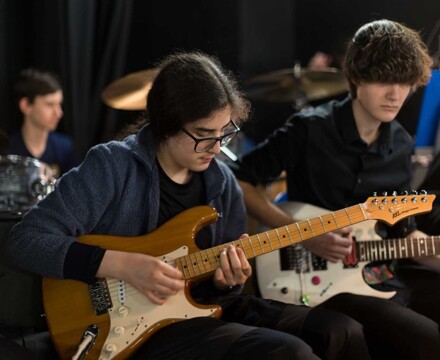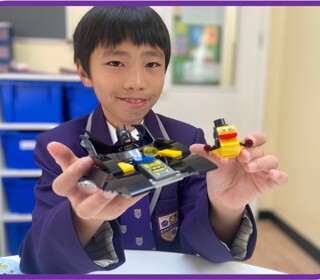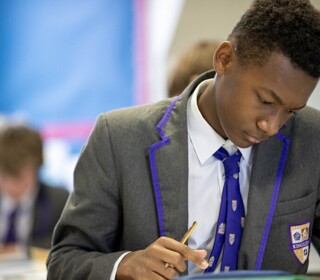- Home
- Senior School
- Senior School Curriculum
- Subjects
- Music
Music
Explore Music at Kingsley School
At Kingsley School, our music curriculum offers an inspiring journey for students to discover, develop, and showcase their musical talents. From engaging Key Stage 3 projects to GCSE and BTEC Level 3 courses, we provide a diverse and inclusive programme tailored to all interests and abilities. Whether composing original pieces, mastering performance skills, or exploring music theory, our students thrive in a supportive and dynamic environment. With state-of-the-art resources and a passionate teaching team, we prepare students for success—whether pursuing higher education, a career in music, or simply a lifelong love of creativity and expression.

Music: Years 7-9
Summary
Music is available for all students at Key Stage 3 and as an option at GCSE and A Level (BTEC Level 3). In addition to the curriculum music lessons, the department also runs a vibrant co- and extracurricular programme of activities, clubs, events, and performances that showcase the diverse musical talents of our students. A plethora of instrumental lessons runs throughout the week, delivered by a committed team of visiting instrumental staff.
At Key Stage 3, students cover various musical styles and disciplines within our Arts Award project. The Arts Award has students working towards projects covering music, drama, and art to produce a showcase performance at the end of each term. In music, students learn about songwriting, composition, and rehearsal performance skills using various means of music-making, whether it be singing, instrumental, or creating through music technology.
Kingsley’s music department welcomes students of all musical genres and encourages everyone to explore unfamiliar genres through classroom-based learning and our co- and extracurricular programme. Students can access various instruments in the curriculum, such as ukuleles, keyboards, electric/acoustic guitars, bass guitars, and percussion. We also encourage students to use their own orchestral instruments and are fortunate to have a suite of MacBooks, which Key Stage 3 students use with GarageBand and Logic Pro X.
Regarding skills development, the following is a basic guide to how we structure the progression of our Arts Award. All skills focus on the core musical elements: Dynamics, Rhythm, Texture, Structure, Melody, Instrument (and Timbre), Tonality, and Harmony.
Performance
Perform and compose songs/compositions as a soloist or as part of a group in response to a creative stimulus, developing an awareness of others and one’s role.
As students progress through Key Stage 3, the complexity and technical skill increase, with students learning nuanced melodies, chord progressions/harmony, rhythms, and expression. Students develop technical skills and also work in different group contexts, learning how to contribute effectively to their projects.
Songwriting & Composition
Arts Award (non-GCSE Music syllabus) projects demonstrate different compositional devices and methods, progressing to learning how to use these devices and methods for more elaborate pieces. This leads to understanding how to use stimuli to write songs and compositions that reflect the story or context of the project.
Musical Literacy
Students are introduced to the core musical elements in a learning-by-doing environment, embedding them into practical work, which they then use in their music-making. Learning traditional stave notation is a key focus, but other notational forms, such as tablature and piano roll, are also used. By focusing on a ‘sound over symbol’ ethos, we aim to help students understand why and how music is constructed, exploring what successful composers use and the effects it has on the listener.
Music: GCSE
Summary
GCSE Music at Key Stage 4 (AQA syllabus) helps students develop subject knowledge, theoretical understanding, musicianship, and composing skills, with choices catering to a wide range of interests and abilities. The syllabus is divided into three sections: performance (solo and group), composition, and an exam that assesses students’ skills in listening and appraising set works taught throughout the course.
GCSE Music provides a solid foundation for progression to further music studies, including BTEC Level 3 Music, and often leads to music-related careers. Our course allows students to develop valuable transferable skills such as self-confidence, concentration, creativity, evaluation, and teamwork. We are delighted to have received the ISM Gold Medal for the last two years in recognition of over 20% of the Key Stage 4 cohort taking GCSE Music.
Course Details
The GCSE Music syllabus is designed to engage pupils in music-making and develop them as effective, independent learners and reflective thinkers with enquiring minds. Students expand their musical interests, learn to appreciate various musical cultures and disciplines, and enjoy performing individually and in groups. It is strongly advised that pupils taking GCSE Music have individual instrumental lessons, and there is an expectation that they will participate in performances, recitals, and shows throughout the school year.
Typical Activities
• Performance: Preparing for a solo performance as a lead and a group performance assessed as part of an ensemble.
• Composition: Preparing a piece to a given brief and another of the composer’s choosing, e.g., free composition.
• Analyse music set works and recordings: Learning characteristics related to musical elements.
• Score analysis: Annotating scores accompanied by the corresponding music.
• Exam preparation: Mock papers, exam techniques, and strategies for managing stress when preparing for work submissions and sitting the final exam.
Music: BTEC Level 3
Summary
BTEC Music at Key Stage 5 (Pearson) is designed to allow students to pursue their own musical interests through research, instrumental practice, and coursework completion, resulting in a portfolio of work rather than sitting an exam at the end of their sixth-form studies. The coursework (units) will be completed by students and, depending on the unit, can be undertaken as part of a team or individually (though coursework must be submitted individually).
The BTEC specification is designed to offer students greater freedom and depth in their studies while cultivating independence. Students can, for instance, choose to research and/or perform Western classical repertoire and popular music. They may also choose to complete units outside of Western classical/pop music, covering African, Folk, and Asian music, for example. Students will have access to Logic Pro X, providing opportunities for electronic-based music, MIDI programming, scoring to media, and other compositions that use the program.
Course Details
Over the two-year duration, students must complete mandatory units and select optional units from the Music Performance list. The mandatory units cover the foundations of music theory, practical musicianship, knowledge of the music industry and related careers, and performance skills, which are designed to develop students into well-rounded and knowledgeable musicians.
The optional units range from learning about improvisation in performance, composition, genre-specific work, and solo performance.
For students who wish to study music in higher education after completing BTEC Level 3, opportunities include:
- BA (Hons) in Music if taken alongside an A Level in Music and a Pearson BTEC Level 3 National Extended Certificate in Performing Arts.
- BA (Hons) in Music Business if taken alongside a BTEC Level 3 National Foundation Diploma in Business or A Levels in Business and Maths.
- BA (Hons) in Music for Media if taken alongside a Pearson BTEC Level 3 Diploma in Sound Production or Music Technology.
Learners should always check the entry requirements for degree programmes with specific higher education providers.
For students who do not wish to pursue music in higher education, the BTEC Level 3 course provides opportunities to develop employability skills, such as:
- Cognitive and problem-solving skills: using critical thinking, approaching non-routine problems by applying expert and creative solutions, and using systems and technology.
- Interpersonal skills: communicating, working collaboratively, negotiating and influencing, and self-presentation.
- Intrapersonal skills: self-management, adaptability and resilience, and self-monitoring and development.
Recommended Entry Requirements
- GCSE Music Grade 4 if studied; or
- Pass in Music BTEC Level 2; or
- Portfolio assessment.
Further Considerations
BTEC Music combines well with all subjects and enables access to a range of music courses at universities, music institutes, and conservatoires.



